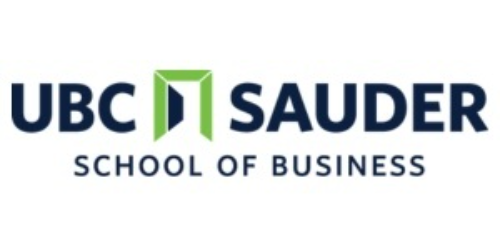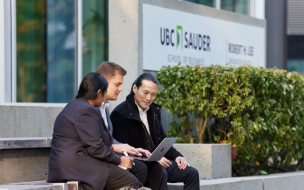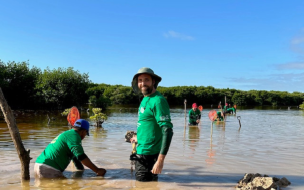In product development, Shweta Desai knows how important it is to pay attention to consumer habits and needs. “Even if you have the most technically-sound product, consumers may still reject it. It's not about you, it's about the consumer,” she explains.
In her former job as a product developer at Unilever in India, Shweta saw some of the most extreme examples of how consumer needs differ. Conducting product research in impoverished areas in Mumbai, she saw how adverse living conditions affect even the smallest things she took as a given.
“Consumers would tell me stories about how they would fight with neighbours over water, which was restricted to two hours a day,” Shweta remembers.
Ever since, Shweta has always been motivated to design and develop products which can impact people’s lives through being attentive to certain social and sustainable factors. This is core to her aspiration to be a responsible leader and to have impact—something she hopes her MBA from UBC Sauder School of Business will be able to strengthen.
From Unilever to an MBA
The motivation for Shweta to pursue an MBA started years ago, after she completed her bachelor’s in chemical engineering, when she moved to Mumbai to start working for Unilever as a global product management associate.
She was blown away by the company’s commitment to sustainability, and her first three years there played a huge part in building her mission to have impact through her career and the products she was designing.
“It was really inspiring for young professionals like me to look at the bigger picture in making a difference in society, by not just looking at business growth, but having an impact on the lives of many consumers who do buy their products.”
“It made a big impression on me that I believed in what I did and I could see how my actions could actually make a difference.”
She ended staying at Unilever for six years, before moving to biotech company Novozymes to get more marketing specific experience. The end goal was to become a brand manager: but Shweta felt that she had reached the limits of her knowledge in certain areas and was worried it may restrict her chances.
An MBA was a chance to get a rounded business education and a more holistic approach to marketing. But responsible management was still important to her, and she actively sought out programs that were committed to environmental and social governance issues. The MBA program at UBC Sauder ticked all of these boxes.
How the UBC MBA built on her idea of responsible management
Shweta was keen to build a more rounded idea of how sustainability and ethics impacts each part of a business.
The UBC MBA has five themes which run through the program, one of which is ethics and sustainability. This is touched upon across many of the business cores and electives in the program. As a result, UBC Sauder has been ranked 27th in the world in the 2019 Better World MBA ranking, an annual ranking of business schools with the most sustainability-focused MBA programs administered by sustainable business magazine Corporate Knights.
She praises Professor Tamar Milne, who taught a core module in ethics and sustainability, for offering so many real life examples and situations which were relevant to the learning.
Enhancing her skills as a responsible leader also took on a practical side, through the Global Immersion Experience. This takes students to a choice of different destinations, to get real life consulting experience in profit or non-profit sectors. Shweta worked at a human rights consulting group in Berlin, Germany, where she identified ways the organization could start advising North American companies.
“We did a lot of research on how companies have policies on human rights in North America, and how they could be potential partners for that consulting company.”
How to become a responsible leader
The UBC MBA has contributed to Shweta’s understanding of what responsible management actually means, and going forward, she hopes to bring this to building sustainable products and organizations.
First, conducting sufficient customer research in order to understand consumer needs is vital.
“As a product developer, we tend to be in love with our product. But you need to see, hear, and observe how customers use the product. You shouldn't be so confident that a product will work until a consumer accepts it.”
Secondly, it’s important to consider how small things can make a bigger difference. She recalls how, during her time at Unilever, she met with women in Africa who had to travel for hours to get access to water which they used for cleaning products. By removing the amount of water needed for using certain detergents, she could positively impact many of these women’s lives, allowing them to spend more time with their families.
Lastly, responsible leadership has to come from the very top. She saw this at Unilever, where everyone from the CEO to the workers on the factory floor were committed to their sustainable mission. Leaders have a responsibility to be vocal about these issues in order to influence and shape the company.
“I can see how important it is going forward for any big or small corporations to look at solutions that have a positive impact on our communities.”
With a few months left on her MBA, Shweta is already eyeing up avenues into brand management. As she works her way up into leadership positions, she hopes to continue to embrace this social impact-driven approach to business.








